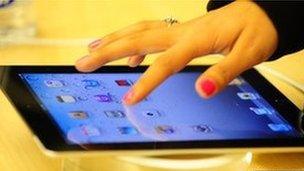Parents use smartphones like a digital dummy, say heads
- Published

Children and teenagers who use electronic devices at night can be too tired to learn, say heads
Computers and smartphones have become a "digital dummy" used by parents to pacify their children, says a head teachers' leader.
National Association of Head Teachers' president Bernadette Hunter said children were left unmonitored in their rooms at night playing on electronic devices.
She said it was interrupting their sleep, leaving them too tired to learn.
Primary school children needed at least 12 hours' sleep, she added.
"Children are coming to school tired because they have stayed up late watching TV or playing on electronic devices like computers and PlayStations in their rooms," she said.
'Technology trouble'
"The parents aren't monitoring that and aren't even realising they are coming to school tired."
This meant children sat in class yawning and not performing at their best, and also that the teacher had to go over things repeatedly.
Ms Hunter said parents of all backgrounds were making such mistakes, with some of them deliberately using smartphones in the daytime like a "digital dummy".
"It's a soother, it's a pacifier. They know it will keep them quiet," she added.
NAHT vice-president Gail Larkin said she thought it was sad that so many parents arrived at school pick-up clutching their mobile phones, and carried on talking into them once they had picked up their children. She said: "I just wonder who is talking to these children?"
The comments came at the NAHT's annual conference in Birmingham, where the association teamed up with charity Family Action to publish a series of leaflets offering advice to parents on school readiness.
The leaflets recommend up to 15 hours' sleep a night for under-fives and at least 10 hours for primary-age children.
"It might seem obvious," said Ms Hunter, "but we have a significant number of children who are arriving in school who haven't had enough sleep or they haven't had breakfast or they don't have the right equipment."
The leaflets also call for parents to "set aside time for talking - without being interrupted by phones, TV, radio, computer".
Ms Hunter criticised parents who allowed their children to be repeatedly late because they were so disorganised.
"Children don't get themselves to school at this age - parents do, and if they are not organised and they're late then they miss their learning."